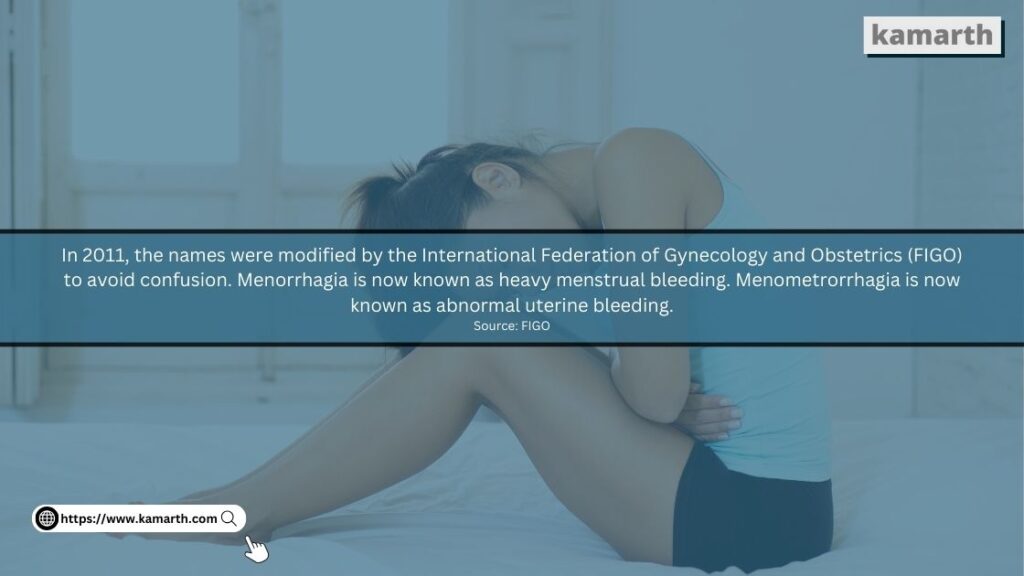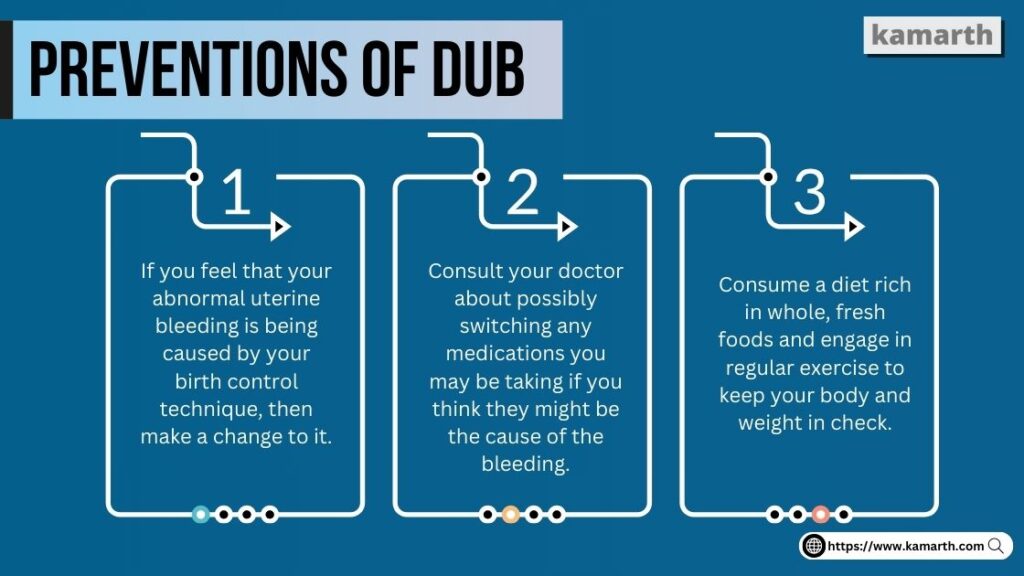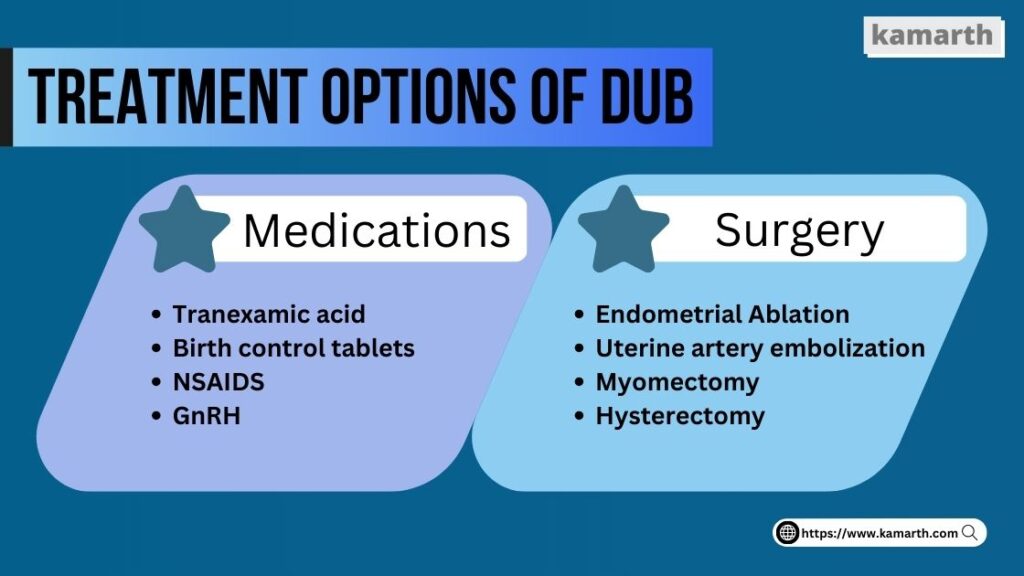Dysfunctional Uterine Bleeding – Abnormal (Dysfunctional) uterine bleeding may be a stressful moment in a woman’s life. It includes any abnormal uterine bleeding that is not associated with your normal menstrual cycle. In this article, we have discussed Dysfunctional uterine bleeding – risk factor, prevention, complication and treatment options. We advise you before reading this article, kindly read abnormal uterine bleeding – symptoms and cause for better understanding. To get the better treatment option read the following article that discusses the risks factor as well as various treatment options.
Table of Contents
What is Dysfunctional Uterine Bleeding?
Abnormal uterine bleeding (previously known as menometrorrhagia) occurs when you bleeding between your menstrual cycles or when your cycles are excessive or long. Normal menstrual flow lasts around five days & occurs every 21 to 35 days.

Your provider should be aware of any Dysfunctional bleeding you are experiencing. It is possible that the cause of your bleeding is harmless. However, your bleeding might be an indication of cancer or another disorder that has a detrimental influence on your fertility.
Learn more: Do girls masturbate?
Dysfunctional Uterine Bleeding – Risk Factor
The development of Dysfunctional uterine bleeding can be linked to several risk factors. Among them are:
- Age: Adolescents and women over 45 are more at risk.
- Obesity: Women who are fat or overweight are more at risk.
- Medication: Women who go through cancer treatments or use anti-inflammatory drugs, or blood thinners are more likely to be affected.
- Birth control: There is a higher risk for women who use an IUD or use birth control.
Read Also: Emergency Contraceptive Pills – Unwanted 72, When to take
What is the Prevention of Abnormal uterine bleeding?
You cannot take any specific precautions against irregular uterine bleeding. However, there are techniques to reduce the risk factors, and they are as follows:

- If you feel that your Dysfunctional uterine bleeding is being caused by your birth control technique, then make a change to it.
- Consult your doctor about possibly switching any medications you may be taking if you think they might be the cause of the bleeding.
- Consume a diet rich in whole, fresh foods and engage in regular exercise to keep your body and weight in check.
Related: Female Condoms – or Internal Condom, How to Use
Can AUB cause Complication?
In most cases, DUB is a temporary state. Abnormal bleeding often stops after the sex hormones are balanced.
One of the primary effects of severe bleeding is anemia. If you have severe blood loss and develop anemia, your doctor may prescribe vitamin and mineral supplements to address the condition.
Rarely, if the bleeding has resulted in a substantial loss of blood, you could require a blood transfusion.
Learn More: Endometriosis: Stages, Causes, Symptoms, Diagnosis
Diagnose
Taking thorough notes over several menstrual cycles might be beneficial in providing the doctor with particular details about your symptoms. They will also do a medical examination and inquire about your general health. In addition to receiving a pregnancy test, you could also have:
- Blood test: Your body may become iron-deficient after extensive bleeding. If you’re having issues with that, a blood test can help. It may also indicate an imbalance in your hormones, a blood condition, or an ongoing medical condition.
- Magnetic resonance imaging: This test creates finely detailed images of your uterus using strong magnets and radio waves. It’s not very common, but it can be useful in identifying adenomyosis.
- Hysteroscopy: Through your cervix, the doctor will insert a small, light-filled scope to examine the inside of your uterus.
- Biopsy: The physician could remove a little sample of tissue and examine it under a microscope to look for any abnormal cells.
- Ultrasound: This allows your doctor to check for fibroids or polyps inside your uterus by creating pictures of its inside using sound waves.
Read Also: Is Masturbation good or bad? – Benefits, Addiction, Disadvantage
Treatment
The reason behind your Dysfunctional uterine bleeding will determine how you are treated. Treatment may be beneficial if your symptoms are caused by a blood problem or chronic illness.
The treatment may also vary according to your family planning intentions. Certain medications may make it unsafe to become pregnant, while others may completely prevent it. In cases when menopause is imminent, the doctor might want to wait and observe, since your symptoms might resolve on their own.

Usually, your doctor will give you medications first. Among them are:
- Tranexamic acid. This medication aids in blood clotting and helps manage excessive uterine bleeding.
- Hormones: Birth control tablets and other hormone therapies may help you have regular menstrual cycles and lighter periods.
- NSAIDS: Anti-inflammatories such as ibuprofen or naproxen may help reduce bleeding if you take them a few days before the onset of your period.
- Gonadotropin-releasing hormone (GnRH) agonists and antagonists: These prevent your body from producing particular hormones, therefore controlling severe bleeding. Fibroids could shrink for a period of time. Usually, they are used together with other medicines.
- IUD: Heavy bleeding may be stopped for some women by an IUD that delivers the hormone progestin. Many women who take one do not experience a period at all. If your fibroids are in the cavity of your uterus instead of the wall, they might not be the best option for you.
Sometimes, surgery may be required to control the bleeding:
- Endometrial ablation: This method of surgery will destroy your uterus’ lining using heat, cold, electricity, or a laser. It could completely stop your periods. You are rare to become pregnant as a result of the procedure, although doing so can be dangerous. Birth control is required until menopause.
- Uterine artery embolization or myomectomy: Your doctor could remove your fibroids or cut off the blood arteries that feed them if you have them.
- Hysterectomy: At this point, the uterus is removed by a doctor. Hysterectomy is the only option of surgery if you have uterine cancer or endometrial, or if your fibroids are particularly big. Otherwise, it is a last option if other treatments have failed.
Related: 07 Common Causes of Sexual Performance Anxiety and How to Overcome It Fast
A note from kamarth
You are the only person who knows what is better and normal for you, including how long your cycles last and how heavy that bleeding is. Consult your healthcare professional if you’re experiencing unusually heavy or prolonged periods, or if you’re bleeding besides your menstrual cycle. You should never be ashamed of yourself or suffer in silence. You have a lot of non-invasive treatments at your fingertips to stop your bleeding.
Some Additional Doubts
Question: What is Dysfunctional uterine bleeding?
Answer: DUB includes bleeding between menstrual cycles or excessive, long periods.
Question: Who is at higher risk for AUB?
Answer: Adolescents, women over 45 years old as well as those who are overweight are at higher risk.
Question: Can birth control cause abnormal uterine bleeding?
Answer: Absolutely, using an IUD increases your chance of developing DUB.
Question: What are the possible complications of Abnormal Uterine Bleeding?
Answer: Severe bleeding can lead to anemia & in rare cases, you may require a blood transfusion.
Question: How is abnormal uterine bleeding treated?
Answer: Medications, Hormone therapy or various surgeries are the available treatment options, however the treatment options are dependent on cause of DUB..
Read More:-
Understanding Miscarriage – Critical Prevention, 05 way to Diagnosis, and Effective Treatment
Porn Addiction – Is it real?, Causes, Signs, Harmful, Beneficial
Is Breast Size Matter? – Is bigger best, types
Male Condoms: Your Ultimate Barrier Against STIs & Pregnancy
Teenage Marriage – Cause, Implication, Why should it stop?
Reference links:-
https://medlineplus.gov/ency/article/007496.htm
https://www.researchgate.net/publication/326636895_Study_on_abnormal_uterine_bleeding_among_adult_women_in_a_tertiary_care_hospital_in_Bihar_India
https://www.ncbi.nlm.nih.gov/pmc/articles/PMC4970656/
https://www.sciencedirect.com/science/article/pii/S1521693415002266
https://medicine.yale.edu/obgyn/education/wham/moderator/1.%20abnormal%20uterine%20bleeding_407550_51433_v1.pdf
